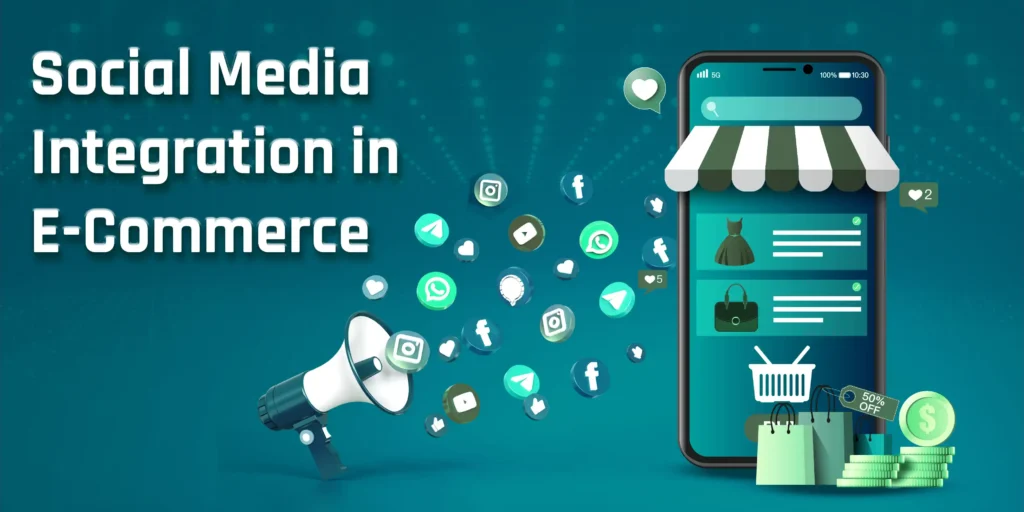Social media integration in e-commerce refers to seamlessly incorporating diverse social media channels and capabilities into online shopping platforms. This integration permits businesses to leverage the power of social media advertising and marketing and tap into the big capabilities of social commerce.
Introduction
In the ultra-modern virtual age, the e-trade sector has witnessed an extensive shift in consumer behavior. With the rise of social media systems, online shopping has become more than just a transactional experience. It has evolved into a social and interactive process, thanks to the combination of social media and e-trade websites.
The significance of social media integration in e-commerce cannot be overstated. It offers numerous benefits for companies and purchasers alike. For groups, it offers an opportunity to engage with their target market on an extra personal level, construct logo loyalty, and grow visibility through consumer-generated content.
On the other hand, purchasers gain from social media integration because it permits them to discover new products or services through guidelines from friends or influencers they observe. They can also make informed purchasing choices by accessing opinions and scores shared by different users on social media systems.

Integrating social media into e-commerce allows for seamless sharing of products or purchases on various systems, increasing reach and doubtlessly attracting extra site visitors to online stores.
In this Blog, we can delve deeper into the extraordinary aspects of social media integration in e-commerce. We will discover its effect on online purchasing experiences, speak about successful use cases in various industries, and offer insights on how businesses can efficiently leverage this powerful tool for growth.
So, let’s dive in and uncover how integrating social media with e-commerce is transforming the way we store online!
Enhancing customer engagement through social media integration
Integrating social media structures into an enterprise’s advertising and marketing methods can greatly enhance customer engagement. Social media has emerged as an imperative part of human being’s lives, and agencies can leverage this by creating a robust social media presence.
One of the important benefits of social media integration is the ability to foster direct communication with customers. By actively engaging with users through feedback, messages, and mentions, groups can construct a better relationship with their target audience. This not only increases brand loyalty but also affords valuable insights into client options and needs.
Another powerful element of social media integration is the use of consumer-generated content (UGC). Encouraging customers to share their experiences and reviews via posts, evaluations, or testimonials creates an experience of authenticity and agreement. UGC no longer only showcases real-life services or product experiences but also permits natural word-of-mouth advertising and marketing.
leveraging client critiques on social media systems can extensively impact shopping decisions. Positive reviews serve as powerful endorsements for ability customers, while bad comments present a possibility for companies to cope with concerns publicly and show their commitment to client delight.
Integrating social media into an agency’s marketing approach allows for direct communication with clients, harnessing the strength of user-generated content, and leveraging patron opinions to enhance engagement. By actively using these structures, corporations can create meaningful connections with their target market and force good brand sentiment.
Influencer Marketing: Leveraging Social Media Influencers to Drive E-Trade Sales
Influencer advertising has grown to be a powerful strategy for driving e-commerce income. By leveraging the recognition and influence of social media influencers, brands can efficaciously attain their target market and boom emblem cognizance.
One of the key components of influencer marketing is influencer collaboration. Brands partner with famous social media influencers who have a big following and engage with their audience regularly. These collaborations can take numerous forms of paperwork, which include backed posts, product evaluations, or even emblem ambassadorships.
Social media endorsements from influencers can significantly affect client purchasing decisions. When an influencer promotes a product or service on their social media platforms, their followers consider their guidelines and are more likely to make a purchase. This is because influencers have constructed a courting relationship with their audience through real content and relatable stories.
In addition to driving sales, influencer marketing also allows brands to construct logo loyalty and credibility. By aligning themselves with professional influencers who share comparable values and aesthetics, manufacturers can decorate their emblem photographs and connect with clients on a deeper level.
Influencer marketing provides substantial capacity for e-commerce corporations to enhance sales and establish a robust online presence. By strategically collaborating with social media influencers and leveraging their impact, manufacturers can tap into new markets, engage with capacity customers, and ultimately force sales booms.
Turning Social Media Followers into Customers
Shoppable posts have revolutionized the way agencies interact with their social media followers. With the introduction of buy buttons and click-to-purchase features, platforms like Instagram have created a continuing shopping experience for users, turning casual browsers into capacity clients.
Shoppable posts permit businesses to tag products immediately in their social media posts, giving fans the ability to make purchases with just a few clicks. This removes the desire for users to leave the platform and search for products on outside websites, streamlining the purchasing technique and increasing conversion costs.
Instagram’s purchasing tags, for example, enable groups to show off their products in a visually attractive manner. By tapping on a tagged product in a put-up or story, users can view additional information, including pricing and product descriptions. They can then proceed to make purchases without ever leaving the app.
The electricity of shoppable posts lies in their capacity to bridge the space between concept and movement. Users are more likely to make impulse purchases after they see something they love while scrolling through their social media feeds. Shoppable posts capitalize on this by providing a direct opportunity to buy.
For organizations, shoppable posts offer precious insights into patron behavior and preferences. By monitoring engagement and sales metrics related to particular shoppable posts, groups can refine their advertising strategies and tailor content that resonates with their target audience.
Shoppable posts with features like buy buttons and click-to-purchase options have converted social media systems into powerful e-trade tools. They empower companies to turn their social media fans into dependable clients by providing a seamless purchasing experience within the systems themselves.
Social Commerce Tools and Plugins to Integrate into Your E-Commerce Platform
In the latest virtual landscape, integrating social commerce tools and plugins into your e-trade platform has turned out to be vital for fulfillment. These gears let you leverage the energy of social media to pressure sales and beautify the overall buying experience for your customers.
One important factor in social commerce integration is utilizing e-commerce plugins that seamlessly join your online store with popular social media platforms. These plugins enable you to show off your merchandise directly on platforms like Facebook, Instagram, and Pinterest, permitting capacity clients to browse and purchase items without leaving their desired social media platform.
Another critical feature supplied with the aid of these plugins is shopping cart integration. This functionality ensures an easy transition from browsing products on social media to finishing the checkout process on your e-commerce website. By streamlining this process, you lessen friction for clients and increase the probability of changing their hobby into a sale.
Integrating social login plugins simplifies the registration and login process for customers by letting them sign up for their current social media accounts. This now not only saves time but also gets rid of the desire for users to bear in mind yet another username and password aggregate.
By incorporating that effective gear into your e-commerce platform, you may tap into the good-sized ability of social trade. Not only will it enlarge your attainment by leveraging famous social media systems, but it’s going to also enhance people’s enjoyment and ultimately boost conversions.
Tracking the Success of Your Social Media Integration
To effectively tune the fulfillment of your social media integration efforts in e-commerce, it is crucial to make use of numerous dimensions and evaluation techniques. This lets you gain insights into the effect of your social media activities on conversion prices, sales attribution, and customer behavior.
One key factor in monitoring social media integration is utilizing social media analytics gear. These tools enable you to reveal the overall performance of your social media campaigns, tune engagement metrics, which include likes, shares, and remarks, and measure the attainment and impressions of your posts. By studying this information, you could become aware of which platforms and content types are driving the most visitors and conversions.
Conversion monitoring is another crucial element in measuring the fulfillment of your social media integration efforts. By enforcing conversion monitoring pixels or codes on your e-commerce website, you could use characteristic sales or precise movements to characterize social media campaigns or posts. This permits you to determine which channels are producing the very best return on investment (ROI) and optimize your techniques as a result.
Customer conduct evaluation plays an important role in knowing how your target market interacts with your logo on social media. By studying user conduct data consisting of click-on-via quotes, time spent on site, bounce prices, and path evaluation, you can gain insights into how one-of-a-kind segments of your target audience interact with your content material. This statistic can help inform destiny, concentrating on techniques and content introduction.
By utilizing social media analytics equipment for monitoring engagement metrics, implementing conversion monitoring for correct income attribution evaluation, and conducting client conduct evaluation for deeper insights into audience interactions, you may correctly degree the fulfillment of your social media integration efforts in e-trade.
FAQS
Social media integration in e-commerce helps businesses reach a wider audience, build brand awareness, and engage with potential customers. It also provides a platform for seamless marketing and customer interaction.
The effectiveness of platforms varies, but commonly used ones include Facebook, Instagram, Twitter, and Pinterest. The choice depends on your target audience and the nature of your products.
Social media integration facilitates product discovery, allows for direct shopping on platforms, and enables personalized marketing. This enhances the overall shopping experience, leading to increased sales.
Conclusion
In conclusion, integrating social media into your e-commerce commercial enterprise can have a profound impact on its fulfillment. With the power of social media structures, you may reach a much broader target market, interact with potential customers, and force more visitors to your online store.
Embracing the strength of social media integration is crucial for any e-trade enterprise trying to thrive in the latest digital panorama. By making use of those platforms efficiently and strategically incorporating them into your marketing strategy, you could skyrocket your commercial enterprise boom and stay ahead of the opposition. So don’t miss out on this wonderful opportunity—begin integrating social media into your e-commerce enterprise nowadays!
